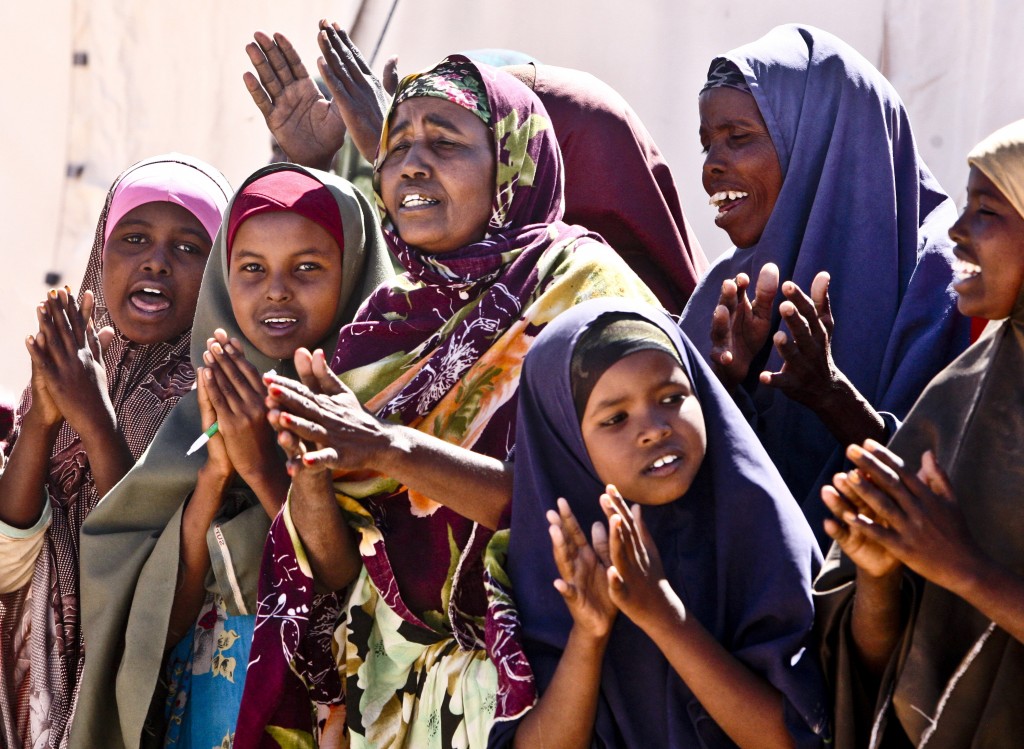Kevin MacDonald
Occidental Observer
September 26, 2014

In his article on the Africanization of France, Guillaume Durocher notes that
no doubt North American White Nationalists can be critical of the FN’s [National Front’s] positioning [i.e., their public stance that they are unconcerned whether the ethnic French become a minority in France]. I would note however that, as of today, this position is necessary for the FN to be a media-acceptable and potentially electable political party (in contrast for example with the British National Party, which nonetheless does important counter-cultural and metapolitical work). If Marine Le Pen becomes President of the Republic, as a recent poll suggests she could if she faces François Hollande in the second round in 2017, then no doubt freedom of speech on this topic would be much greater in France. For example, already Prime Minister Viktor Orbán in Hungary has been able to argue with other European leaders that “[t]he goal is to cease immigration whatsoever” and that “the ethnic basis of the Nation-State” should not be broken.
Another case where moderating the message can result in important influence on issues such as immigration policy is illustrated in the contrast between Norway and Sweden, as discussed in a New York Times article by Hugh Eakin (“Scandinavians Split over Syrian Influx“).
AFTER eight years of center-right rule, the narrow victory of the left-leaning Social Democratic Party in Sweden’s national elections last Sunday marked a broad shift in the country’s politics. But the new coalition government the party hopes to form is unlikely to reconsider one of the country’s most challenging policies: its response to a war being fought some 2,000 miles away. The country has taken an open-door approach to people fleeing the conflict in Syria, which is bringing more Syrians to Sweden than to any other European country.
Never mind that Sweden has double-digit youth unemployment. That there have been riots in immigrant neighborhoods in Stockholm. That there is a severe housing shortage for new arrivals. Or that the Swedish Migration Board, which handles asylum seekers, needs a drastic budget increase — almost $7 billion — to cover soaring costs over the next few years.
And never mind that the far-right, anti-immigrant Sweden Democrats won 13 percent of the vote in Sunday’s election, their best showing ever. They more than doubled their seats in Parliament — from 20 to 49 — and are now the third-biggest party in the country.
“We are the moral guardians of the world,” Magnus Ranstorp, a specialist in counterterrorism at the Swedish National Defense College, told me a few days before the election, referring to Swedes. “We haven’t fought a war in 200 years. We are righteous. But sometimes the righteousness doesn’t meet reality.”
And never mind the increases in crime rates, long term poor educational outcomes, welfare dependency, aggressive Islamization of immigrant areas, and widespread hostility and resentment toward Swedes and their culture). In other words, never mind that the Swedes are losing the country their ancestors have lived in for probably over 20,000 years.
Despite all the obvious costs of this onslaught for native Swedes, the political class in Sweden has seen fit to open the door the entire population of Syria (22.85 million) if they so desire.
Mr. Ranstorp’s comment on Sweden being the moral guardians of the world is another example of pathological altruism that seems most virulent in northwest European countries. Indeed, according to the present prime minister, the economic costs of immigration to Swedes should not be part of the equation:
[Prime Minister Fredrik Reinfeldt] asked voters to “open their hearts” to Syrian refugees, even though the escalating cost of supporting them would preclude further welfare benefits for Swedes. The comment caused an outcry — not because it seemed to favor refugees over Swedes, but simply for suggesting that refugee policy needed to be considered on economic grounds.
Pathological altruism on steroids. Usually there is lying, obfuscation, and ignoring the costs of multiculturalism by the elite media and political class. Here Swedish voters are openly condemned as moral miscreants if they take the economic costs into account. The imagined moral obligation to help people who are radically different ethnically and culturally — an obligation continually harped on by Swedish elites — trumps all other considerations.
This insanity enabled by moral condemnation struck home to me in a 2012 article on Ingrid Carlsqvist, a Swedish writer:
In Sweden there is enforced silence on any criticism of multiculturalism in the above-ground media. Discussing the cancellation of a talk because it was sponsored by a politically incorrect newspaper, [Carlqvist] comments, “That’s the way it works in the New Sweden, the country I call Absurdistan. The country of silence.” Violating the silence is met with moral outrage intended to produce shunning and ostracism:
I was born in Sweden in 1960, when the Social Democrats were gonna rule forever and ever and our country was the nicest and safest and most progressed in the world. Now I live in Absurdistan – a country that has the highest figure of reported rapes in the world, hundreds of so called “exclusion areas” where people live outside the Swedish society and with newspapers that hide all these horrible facts to the people. …
The situation in Sweden is far worse than in Denmark. In Sweden NOBODY talks about immigration problems, the death of the multiculti project or the islamisation/arabisation of Europe. If you do, you will immediately be called a racist, an Islamophobe or a Nazi. That is what I have been called since I founded the Free Press Society in Sweden. My name has been dragged through the dirt in big newspapers like Sydsvenskan, Svenska Dagbladet and even my own union paper, The Journalist. …
That’s the way it works in the New Sweden …. The country of silence.
The Eakin article points out that its quite different in Norway:
A far wealthier social democracy than Sweden, Norway spends a greater share of gross domestic product on humanitarian assistance than any other country in the world. It also has the lowest unemployment in Europe and, like Sweden, several decades of experience with immigration.
Yet Norway is not encouraging asylum-seekers. …
As an evolutionist, my default position is to look to explain differences by positing ethnic differences. But here we have two Nordic countries with very different attitudes on immigration. Eakin claims that that the Norwegians are different because of “a strong tradition of free speech and efficient administration,” but I suggest that the fact that an immigration-critical party is part of the government is critical.
Unlike the far-right Sweden Democrats, which have been shunned by other Swedish parties, Norway’s own anti-immigration party, the populist Progress Party, has entered a coalition government and makes its concerns heard. Solveig Horne, the minister of children, equality and social inclusion, and a member of the Progress Party, complains that Norway already has more asylum seekers than it can accommodate. “More and more are allowed to stay in Norway,” she told me in Oslo last month. “But many communities are saying, ‘Wait. We have to be sure we can integrate the people we already have.’ ”
This is just the kind of blunt talk that is strictly avoided in Sweden.
Norway, like Sweden, has succumbed to the idea that they must take in more and more immigrants, but at least there is a moderating force within the mainstream that is making immigration an issue. Like the Swedish Democrats currently, Norway’s Progress Party was excluded from government for decades mainly because of its position on immigration. The Progress Party has never adopted any racialist rhetoric and has expelled politicians from the party whose views on immigration were seen as too “extreme.” But the good news is that it is now part of the center-right government after polling 16.3% in the 2013 Parliamentary election — not much more than the Sweden Democrats in the most recent election — and making it the third largest party in Norway.
The Progress Party’s positions on immigration are not ideal, but it is definitely a start. From Wikipedia:
The party claims the immigration and integration policy to be naïve.[135] In 2009, the party proposed an official goal of reducing accepted asylum seekers by about 90%, from 1,000 to 100 a month, the standards then said to be used in Denmark and Finland,[137] although less than 100 a year was proposed in 2008.[138] In 2008, the party wanted to “avoid illiterates and other poorly resourced groups who we see are not able to [adapt to] Norway”; which included countries as Somalia, Afghanistan and Pakistan.[138] The party opposes that asylum seekers are allowed stay in Norway on humanitarian grounds or due to health issues, and seeks to substantially limit the number of family reunifications.[138] The party has also called for a referendum on the general immigration policy.[39][139][140]
Similarly, the Danish People’s Party has been able to influence immigration policies with around 12-13% of the vote. “Cooperation with the Conservative-Liberal coalition government resulted in the implementation of some of their key demands, most importantly strong restrictions in immigration policies, which have resulted in what is often described as Europe’s strictest immigration laws.[32] “Although they are not part of the ruling coalition, they were able to achieve a stricter immigration policy by supporting the Conservative-Liberal coalition government.
You’ve got to love this response to criticism from the Swedish government on the DPP’s immigration policies. Former leader of the DPP, Pia Kjærsgaard: “If they want to turn Stockholm, Gothenburg or Malmö into a Scandinavian Beirut, with clan wars, honour killings and gang rapes, let them do it. We can always put a barrier on the Øresund Bridge.”[32]
The lesson I am getting from this is that becoming part of a coalition government, even with less than 20% of the national vote, can have major consequences on immigration in politically splintered European countries governed by coalitions. Successful parties have made alliances with the mainstream, eschewed racialist rhetoric, and expelled members who were seen as a liability.
In France, as noted by Guillaume Durocher, the National Front has adopted a similar strategy that flies under the media radar, and right now Marine LePen is topping the presidential polls. Even a substantial percentage of Jews are sympathetic to the FN despite the fanatical opposition of the leadership of Jewish organizations. A recent JTA article noted that around 13% of Jews the National Front because of statements against Arab anti-Semitism (“France’s National Front gaining among Jews with tough stance on Arab anti-Semitism“). Again, softening the rhetoric seems to be paying off.
Given the domination of U.S. politics by the Democrats and Republicans, this will not happen in the U.S. without a White populist third party. (There have been rumblings about third parties even from blockheads like Sean Hannity who reiterated his call for a third party recently on his radio show.) Offhand, I can’t think of one U.S. politician who opposes the catastrophic levels of legal immigration. (There are now over 41 million immigrants, legal and illegal, in the U.S.)
But it’s a good start for Europe. And once these parties are seen as a normal part of the political landscape, the guilt-based psychological barriers will begin to fall to the point where these parties could become politically dominant and begin to make radical changes in immigration policy.
White people are altruistic, even pathologically so. But there’s a point, even for Scandinavians, when self-interest necessarily kicks in, and the messages disseminated by hostile elites lose their ability to produce guilt. Let’s hope it’s soon.
The practical benefits of toning down the message do not imply that it is counterproductive for outlets like TOO to emphasize racial as well as cultural displacement as well as the economic costs of immigration. It remains important to highlight ethnic conflict, including Jewish influence, and to note ethnically based differences in traits like IQ that increase the costs of immigration.
This counter-cultural and metapolitical work is important even when it is intensively excluded by the mainstream media and political culture because it provides a powerful intellectual and moral rationale for opposing the dispossession of Europeans and their culture.
Even if these ideas cannot at present be part of the mainstream, they may well become part of an implicit counter-cultural opposition — not explicitly expressed, but enhancing the confidence of those who participate in the political arena. These people must necessarily phrase their arguments differently in the present context, and they must be satisfied with small victories.
This work will become even more important as these parties get to the point where they can produce the kinds of shifts in immigration and repatriation that truly meet the morally legitimate interests of Europeans. Given the enormous “soft” and cultural power of the United States – with Hollywood, American pop culture, Ivy League universities and Anglo-American media commanding tremendous influence in Europe and elsewhere – White Americans have a critical role to play in the global cultural struggle for our people, in parallel with national political struggles.
 Daily Stormer The Most Censored Publication in History
Daily Stormer The Most Censored Publication in History


